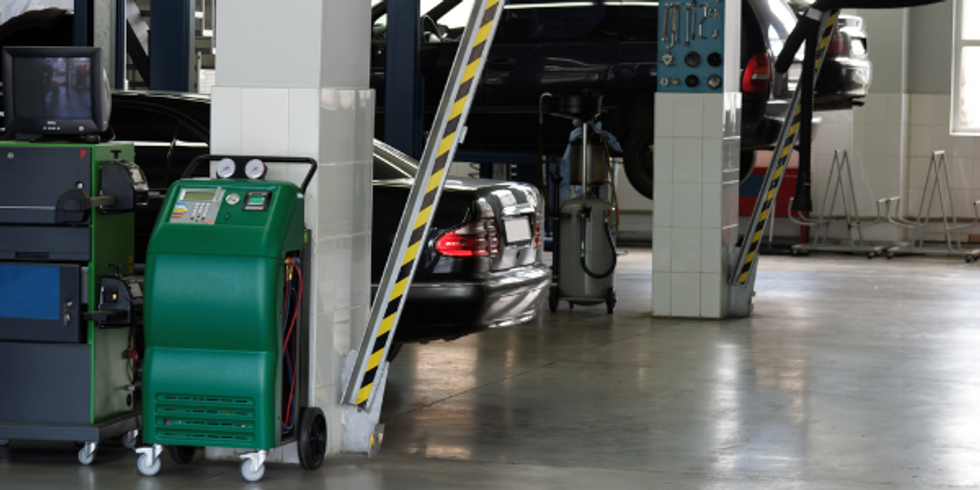
Most mechanics use their skills working for someone else. But if you have business skills and access to some capital, you'll be in a good position to learn how to start an auto repair shop of your own. You should be aware that it takes a lot of hard work of course, so you'll need to prepare accordingly. One of the first things you will need to do is formulate a business plan. I'm sure you've heard the saying before: If you fail to plan, you plan to fail. Every business needs a plan. And this plan is more than simply, “We’ll rent a shop and fix cars for money. If we get enough customers, we will make a profit.” No. You'll need to set a goal on where your business is headed. Your plan will also include things such as advertising methods and expenses, as well as particular (specific) start-up costs that you'll have to pay—that diagnostics machine costs $5,000? You don't necessarily have to open your own auto repair shop from scratch. You could look into buying one that already exists. You'd already have a suitable building to use, as well as a few employees who may stick around under the new ownership, as well as returning customers and an established marketing presence. Another way to get a good head start is to purchase an auto repair franchise. You would work with an established company and operate under their name instead of doing business under your own. There are plenty of benefits of starting a franchise, but there are also a few drawbacks. The most important benefit is that you'll have an established brand-name that customers will recognize. Training and equipment will also be provided generally. However, you may be severely limited with the way that you do business when operating a franchise. If you want to start your own business, then you will need to pick out a proper location. Your location will play a large role in whether your business succeeds or fails. Shops located by highways or in the middle or busy cities typically fare much better. You may even be able to find an old building that already has all the necessary equipment in it. When picking out a location, make sure that you take into account how much the lease will cost you on a monthly basis. The location will also need to be zoned for your particular type of business. This is important. Another important expense that you'll have to pay when starting an auto repair shop is insurance. You'll need insurance for your garage in cause there's a fire, natural disaster or an employee injures themselves. As such, you will also need worker's compensation insurance in case an accident happens. You may not have the cash to pay for everything you need to start an auto repair shop, so you will need to get a loan from a bank or a personal loan from a friend or family. You can expect to pay anywhere between $30,000 and $100,000 to get your business started. You'll need to pay for the building as well as any equipment. You can save some money by leasing the equipment instead of buying it. The amount of money that you'll have to pay will mainly depend on the size of your operation. Starting a shop that can repair up to four cars at a time will obviously be more expensive than one that can only service two. When you start an auto repair shop, you also need to decide what services to offer. You could specialize in a certain area such as heating and air conditioning systems or brakes. However, doing so would significantly limit the amount of money that your shop could make. Most shops are general, but remember that customers love niche businesses, and if you specialize in say, engine repair and tuning for high performance autos, you’ll have a much more established credibility to start off with. However, sometimes it’s best to offer as many services as you can. Even if you or your mechanics don't have the experience to perform a particular service, you could outsource it instead. It's important you look into advertising when starting an auto repair shop. You will need to get customers in the door. Make sure you get a listing in all local online directories, Google places, the yellow pages and consumer review sites such as Yelp and CitySearch. If you can afford it, you may also want to look into radio and television advertising. Just make sure you take the time to do it carefully. Always start out by creating a business plan that outlines your goals, and remember it may take months to a year to finally be profitable. The last piece of advice (if applicable), is to start repairing autos in your home garage, or otherwise rent some small space and start doing simple repairs, and build up your customer base and repetition. For example, offer the first oil change free, do it quickly and very well, and make sure subsequent oil changes are cheap too. Do it for all your friends, family, and neighbors, and soon the word will spread about how fast and economical you are. One you build up a base through simple oil changes, other requests for service will come, and once you open your shop, you will already have guaranteed traffic. Image from Dja65/Shutterstock

 Bigstock
Bigstock Bigstock
Bigstock Bigstock
Bigstock


